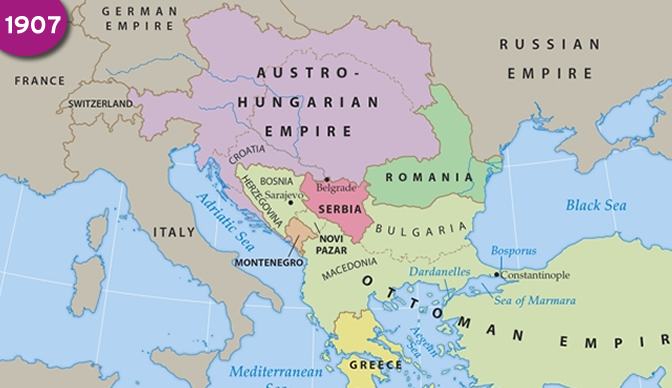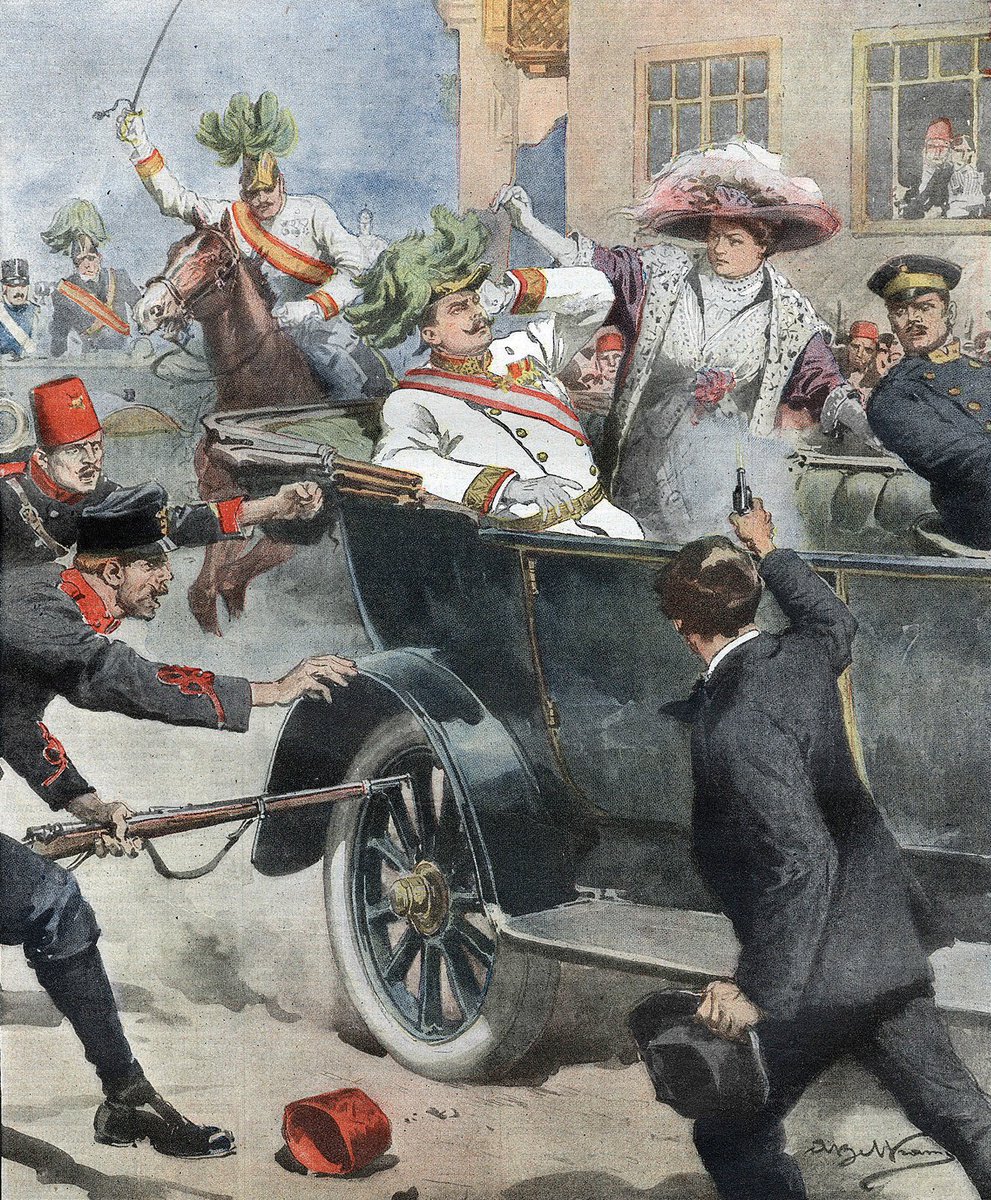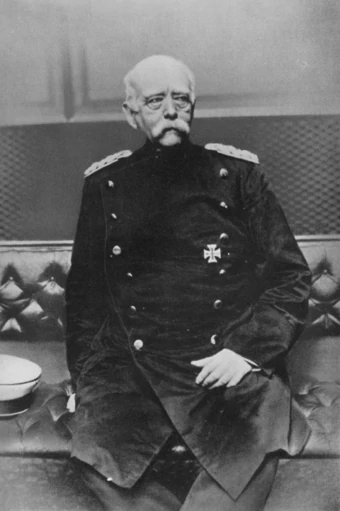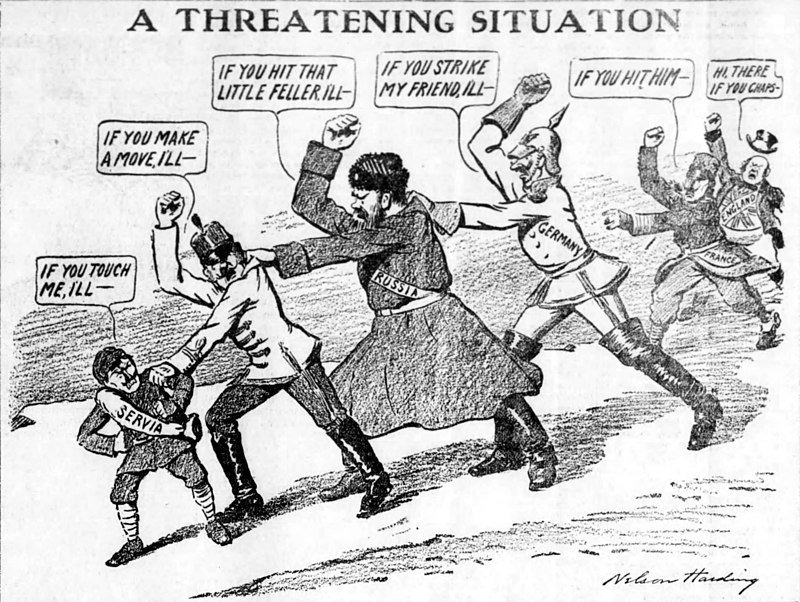The Armenia-Azerbaijan war won& #39;t seem to end.
Will the Caucasus become the Balkans of the 21st Century: a (frequently overlooked) conflict-prone region that eventually sparks a wider war?
Let& #39;s compare the Caucasus 2020 to the Balkans 1914
[THREAD] https://www.reuters.com/article/uk-armenia-azerbaijan/new-clashes-in-nagorno-karabakh-after-washington-talks-idUSKBN2790BC">https://www.reuters.com/article/u...
Will the Caucasus become the Balkans of the 21st Century: a (frequently overlooked) conflict-prone region that eventually sparks a wider war?
Let& #39;s compare the Caucasus 2020 to the Balkans 1914
[THREAD] https://www.reuters.com/article/uk-armenia-azerbaijan/new-clashes-in-nagorno-karabakh-after-washington-talks-idUSKBN2790BC">https://www.reuters.com/article/u...
There are three points to compare
(1) Staunch rivalries (and territorial disputes) in the region
(2) Region marred by conflict
(3) Alliance ties to outside powers
(1) Staunch rivalries (and territorial disputes) in the region
(2) Region marred by conflict
(3) Alliance ties to outside powers
First, there are indeed two staunch rivals in the Caucasus: Armenia and Azerbaijan. In fact, the war currently unfolding between Armenia and Azerbaijan is the second between the two countries since the end of the Cold War https://warontherocks.com/2020/10/the-second-nagorno-karabakh-war-two-weeks-in/">https://warontherocks.com/2020/10/t...
But the tensions between the two states did not disappear and suddenly reappear between 1994 (the first war b/w them) and now. The simmering possibility of military conflict is what makes them "rivals" https://twitter.com/ProfPaulPoast/status/1314178073840029696">https://twitter.com/ProfPaulP...
Turning to the Balkans, a rivalry existed between Serbia and Austria-Hungary well before 1914. In Thompson& #39;s rivalry data, he codes them as rivals since 1903 https://us.sagepub.com/en-us/nam/handbook-of-international-rivalries/book236978">https://us.sagepub.com/en-us/nam...
The two countries had disputes over a host of issues, from trade to, most notably, the status of Bosnia
They also had a number of military disputes between one another during that time (data from the Militarized Interstate Dispute data, https://correlatesofwar.org/data-sets/MIDs )">https://correlatesofwar.org/data-sets...
Of course, we know that this rivalry came to a head in the summer of 1914 with the assassination of Archduke Franz Ferdinand
Second, the Caucasus, like the Balkans, have witnessed its fair share of conflict. Consider that this is the third war to take place in the region since the end of the Cold War: two between Armenia and Azerbaijan and another b/w Georgia and Russia in 2008 https://warontherocks.com/2018/08/the-august-war-ten-years-on-a-retrospective-on-the-russo-georgian-war/">https://warontherocks.com/2018/08/t...
One could broaden out a bit and see that the Caucasus are reflective of current instability within the "former Soviet Union" https://twitter.com/ChristopherJM/status/1313237694898737153">https://twitter.com/Christoph...
The persistence of these conflicts, and the fact that there have been conflicts and crises unfolding in the post-Soviet space since the end of the Cold War, raises questions about the "peacefulness" of the Cold War& #39;s end https://twitter.com/BBCSteveR/status/1313187243255832583">https://twitter.com/BBCSteveR...
Turning to the Balkans, keep in mind that the July crisis of 1914 followed a series of conflicts in the region.
Most notably, there were two wars in the region, in 1912...
Most notably, there were two wars in the region, in 1912...
The conflict potential of the region was so great that Bismarck remarked (or is claimed to have remarked) “One day the great European War will come out of some damned foolish thing in the Balkans."
Third, the countries in the region, notably the staunch rivals, have allies outside/bordering the region.
That Armenia and Azerbaijan have allies in the region is the basis of concern for their current war (or a future war between them) becoming "general" https://www.reuters.com/article/armenia-azerbaijan-int/iran-fears-regional-war-as-azeri-and-armenian-leaders-trade-accusations-idUSKBN26S1A5">https://www.reuters.com/article/a...
The concern is one of "chain-ganging": one actor becoming involved in a conflict will pull in its allies https://www.cambridge.org/core/journals/international-organization/article/chain-gangs-and-passed-bucks-predicting-alliance-patterns-in-multipolarity/F14C4DDDF83A484B673A55E1D925CDAA">https://www.cambridge.org/core/jour...
This is where things become REALLY complicated, as we& #39;re talking about a variety of actors with ties (some formal) in the region: Turkey, Iran, Russia, even potentially @NATO.
To simplify things, let& #39;s focus on Russia.
To simplify things, let& #39;s focus on Russia.
Russia, at least so far, has made clear that its alliance obligations do not require it to intervene... https://twitter.com/ProfPaulPoast/status/1313821128503234561">https://twitter.com/ProfPaulP...
...and this applies more broadly to the post-Soviet space https://twitter.com/TatsianaK/status/1313977126727675910">https://twitter.com/TatsianaK...
Given that Russia is involved in conflict mediation, this could be a case of restraining allies (see @BAshleyLeeds, Johnson, and Fang) https://www.cambridge.org/core/journals/international-organization/article/to-concede-or-to-resist-the-restraining-effect-of-military-alliances/5AE6E043122ECF3754F42E106362DECC">https://www.cambridge.org/core/jour...
What explains the difference in Russia& #39;s behavior then and now? THAT& #39;S a whole other thread!
But the short answer is that Russia, at the moment, is over extended -- it& #39;s presently involved in TOO MANY conflicts. https://thehill.com/opinion/international/521543-armenia-azerbaijan-conflict-adds-to-putins-headaches-wests-worries">https://thehill.com/opinion/i...
But the short answer is that Russia, at the moment, is over extended -- it& #39;s presently involved in TOO MANY conflicts. https://thehill.com/opinion/international/521543-armenia-azerbaijan-conflict-adds-to-putins-headaches-wests-worries">https://thehill.com/opinion/i...
Which speaks to a broader theory of mine https://twitter.com/ProfPaulPoast/status/1204745930144174080">https://twitter.com/ProfPaulP...
In sum, the prospect of the Armenia-Azerbaijan conflict spiraling into a larger regional or major power war seems remote...at this time.
But the same might have been said of the Balkans in 1911, 1912, or 1913 https://abs.twimg.com/emoji/v2/... draggable="false" alt="😬" title="Grimasse schneidendes Gesicht" aria-label="Emoji: Grimasse schneidendes Gesicht">
https://abs.twimg.com/emoji/v2/... draggable="false" alt="😬" title="Grimasse schneidendes Gesicht" aria-label="Emoji: Grimasse schneidendes Gesicht">
[END]
But the same might have been said of the Balkans in 1911, 1912, or 1913
[END]

 Read on Twitter
Read on Twitter








